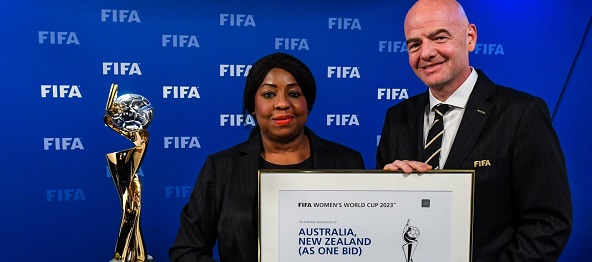DOHA: Australia and New Zealand will host the 2023 women’s World Cup after the countries’ joint bid was chosen by FIFA on Thursday.
The vote was taken by the FIFA Council during its meeting held via videoconference, the result of which was announced by FIFA President Gianni Infantino.
The joint bid submitted by Football Federation Australia and New Zealand Football received 22 of the 35 valid votes cast by the FIFA Council members in the first ballot, with the Colombian Football Association having obtained 13 votes. The full voting results are available below.
The tournament will be the first edition to feature 32 teams and it will also be the first to be hosted by Australia and New Zealand and across two confederations (AFC and OFC).
The overwhelming favourites won ahead of their only rival Colombia, with Japan having withdrawn its own bid earlier in the week and Brazil, Argentina, South Africa and a joint Korean proposal already having fallen by the wayside.
It will be the ninth women’s World Cup.
“WE DID IT! LETS GO AUSTRALIA & NZ! WORLD CUPS COMING HOME”, said Chelsea’s Sam Kerr, the leading star of Australian women’s football, in a celebratory Instagram post.
The joint proposal by Australia and New Zealand will see games played in 13 venues across 12 cities in July and August 2023, with the opening match at Eden Park in Auckland and the final in Sydney.
Seven cities in Australia will host games, and five in New Zealand. There will be two stadiums in Sydney. Four groups will be based in each country during the first phase.
The Australia and New Zealand bid was given the highest score, of 4.1 out of five, in an evaluation by world football’s governing body published earlier this month.
It was followed by Japan, on 3.9, but the Japanese bid was withdrawn on Monday, with the head of the country’s football association, Kozo Tajima, noting that key support was moving towards Australia and New Zealand.
FIFA’s evaluation report gave Colombia a score of just 2.8 out of five as it raised doubts about the ability to provide investment required to carry out “necessary improvements” and also highlighted security worries in the South American country.











